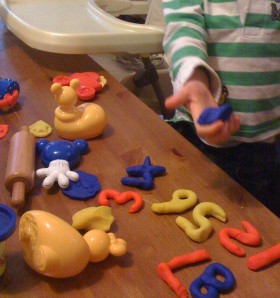I love Penelope Leach. I’m going to come right out and say it. My love affair started long ago when I was in my early teens and I found one of her parenting tomes, cracked spine and well-thumbed, on a shelf in my parents’ junk room. Once I’d discovered it, I often snuck in there in unguarded moments (somehow I felt this was an illicit activity) to find out how to bring myself up.
When I was about to become a parent myself, I randomly decided to read everyone but her. I think the memory of the seventies-style cover of the book my parents owned made me think she must be Old and Out of Date. So I read Gina Ford (talk about out of date!) and the Baby Whisperer and Dr Miriam Stoppard. It wasn’t until I was seven months pregnant with baby number 2 that I found “Your Baby & Child” by Penelope Leach (in a very modern-looking binding) in a charity shop for the appealing price of £1, and decided to see what she had to say. I have been dipping in and out of her book every since, mainly reading about toddlers, and everything she says just makes such perfect sense.
Here is something I read in a section on how to join in with toddler play that made me rethink my life:
“Try, sometimes, to arrange unlimited time for [your toddler’s] games. Many toddlers have to nag ceaselessly in order to get a grudging game from an adult and then they spend most of the 10 minutes allotted to them waiting for the dread words: “that’s enough”. You cannot play with him all day but […] do try, sometimes, to seem willing or even eager, to play yourself, and let him have the luxury of going on until he is ready to stop. He learns by continuous repetition. If ball-rolling is on today’s agenda, he may need to roll a ball for 20 minutes at a time.” (Penelope Leach, 2003, Your Baby & Child, p. 408.)
(The fancy referencing and the elipsis and such are for you, Dad.)
I read this and realised that I am always limiting my playtime with the Toddler. I will play with him for a little bit, but I am always plotting an exit strategy to get back to Important Things like the washing up or Twitter. As an excellent parenting course I attended put it: I am always half-busy. Never with my mind completely on my children, or completely on something else, but always doing both at once and not giving my best, full attention to either. This is not something to beat myself up over, though of course I do, because it is normal. There is not enough time in the day to spend every second completely focused on either the children or the house work or being self-employed, because something will end up not done. You have to multi-task sometimes.
However, I decided that I can, once a day, give the Toddler my unlimited time and attention for something he wants to do, and not stop until he wants to stop. I have tried it with playing his favourite game, Doodlebugs, which is actually very enjoyable. It is no hardship to spend 20 minutes playing Doodlebugs, or playing football, or drawing numbers on the pavement with chalk. And the thing I secretly fear – that he will never ever want to stop – is not true. He does eventually tire and want to do something else. Just not as quickly as I do. But that is okay.
I am not just telling you about all this to show how I am growing as a parent and a human being. There is something in particular that struck me about this passage from Penelope Leach’s book: “He learns by continuous repetition. If ball-rolling is on today’s agenda, he may need to roll a ball for 20 minutes at a time.” (Leach, 2003, p. 408) (for you, Dad) The reason my Toddler – and, it turns out, any toddler – wants to play or do the same thing for hours on end is not because he is obsessed, not because he is a bit boring, but because he is learning.
A case in point: This weekend, the Toddler was playing in the garden while my husband was cooking on the barbecue – this was a fascinating new phenomenon. To observe it better, the Toddler ran inside to get an apple and installed himself on a garden chair with a good view of Daddy.
“Doing, Daddy?”
“I’m doing the barbecue. What are you doing, S?”
“I’m doing apple.”
[pause for munching]
“Doing, Daddy?”
My husband said they must have had this exact conversation about twenty times in a row. When the apple was gone, our son ran inside, got a pear and carried on where he had left off, except now he was “doing pear”. Daddy, being a good sport, was very happy to keep going for as long as the Toddler wanted to. What was he learning? I imagine he was learning about chatting, about turn-taking, about how you can use the verb ‘to do’ to describe an activity, but primarily about how you ask and answer questions, which is a relatively new feature of the Toddler’s language.
A while back, I wrote about the wonders of self-education. I have been looking on, in awe, as my son has taught himself to count and to recognise letters and their sounds, while I have spent my professional life witnessing British teenagers come out of secondary school unable to spell or do simple maths. The question I asked in that post was: what has gone wrong between the joyful self-education of the pre-school years and the antagonistic reluctance to be educated that you find in schools? Now I ask it again. It would seem that toddlers are built for learning. By instinct, they know what to do. They find something that interests them and they are not quite competent at yet, and they explore, experiment and repeat repeat repeat until they have mastered it. We don’t need to teach them how to learn. They know. In fact, we’re mostly the ones trying to stop them doing it.
So, let’s start the debate once more. What do you think? If we start from scratch and invent school as if it had never existed, what would it look like? How can we use what children are born with to help them learn? Should we have listened to Socrates? Or Montessori? Or just Penelope Leach? Tell me what you think in the comments and let’s re-imagine education!
PS: If you haven’t already, watch this amazing TED-talk by Ken Robinson on the subject.


